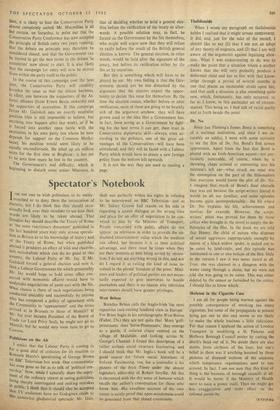Po liticians
on the Air
I notice that the Labour Party is coming in for a good deal of criticism for its reaction to Kenneth Harris's questioning of George Brown on BBC Television last week. One commentator has even gone so far as to talk of `political cen- sorship.' Now, while I naturally share the enjoy- ment of the ordinary viewer at seeing politicians being sharply interrogated and making mistakes
in Public, I think that it should also be accepted that TV audiences have no God-given claim to this somewhat gladiatorial spectacle. Mr. Gait-
skell was perfectly within his rights in refusing to be interviewed on BBC Television—just as Mr. Sidney Greene had reason on his side in regarding a screen dialogue as the wrong time and place for an offer of negotiation to be con- veyed to him by the Minister of Transport. People concerned with public affairs do not appear on television in order to provide the un- doubted entertainment value which the medium can afford, but because it is to their political advantage, and there must be times when they see their interests as best being served by absten- tion. I do not see anything wrong in this, and nor do I regard it as raising the kind of issue in- volved in the phrase 'freedom of the press.' Mini- sters and leaders of political parties are not neces- sarily expected to give interviews to hostile journalists and there is no reason why television interviewers should have greater privileges.






































 Previous page
Previous page